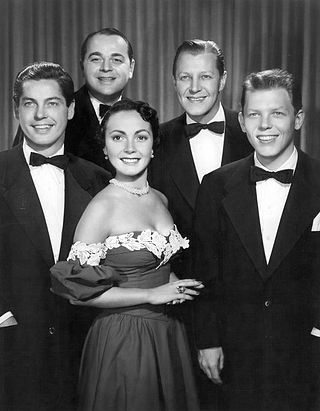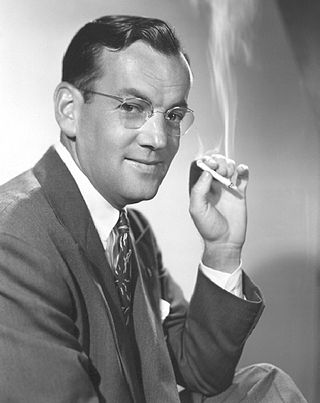
This is a list of notable events in music that took place in the year 1942.

"Chattanooga Choo Choo" is a 1941 song written by Mack Gordon and composed by Harry Warren. It was originally recorded as a big band/swing tune by Glenn Miller and His Orchestra and featured in the 1941 movie Sun Valley Serenade. It was the first song to receive a gold record, presented by RCA Victor in 1942, for sales of 1.2 million copies.

Glenn Miller and His Orchestra was an American swing dance band formed by Glenn Miller in 1938. Arranged around a clarinet and tenor saxophone playing melody, and three other saxophones playing harmony, the band became the most popular and commercially successful dance orchestra of the swing era and one of the greatest singles charting acts of the 20th century. As of 2024, Ray Anthony is the last surviving member of the orchestra.

Marion Hutton was an American singer and actress. She is best remembered for her singing with the Glenn Miller Orchestra from 1938 to 1942. She was the sister of actress and singer Betty Hutton.

Gordon Lee "Tex" Beneke was an American saxophonist, singer, and bandleader. His career is a history of associations with bandleader Glenn Miller and former musicians and singers who worked with Miller. His band is also associated with the careers of Eydie Gormé, Henry Mancini and Ronnie Deauville. Beneke also solos on the recording the Glenn Miller Orchestra made of their popular song "In The Mood" and sings on another popular Glenn Miller recording, "Chattanooga Choo Choo". Jazz critic Will Friedwald considers Beneke to be one of the major blues singers who sang with the big bands of the early 1940s.

"It Happened in Sun Valley" is a 1941 song composed by Harry Warren, with lyrics by Mack Gordon. It was recorded and featured by Glenn Miller and his orchestra in the movie Sun Valley Serenade.

The Modernaires were an American vocal group, best known for performing in the 1940s alongside Glenn Miller.

Sun Valley Serenade is a 1941 musical film directed by H. Bruce Humberstone and starring Sonja Henie, John Payne, Glenn Miller, Milton Berle, and Lynn Bari. It features the Glenn Miller Orchestra as well as dancing by the Nicholas Brothers. It also features Dorothy Dandridge, performing "Chattanooga Choo Choo", which was nominated for an Oscar for Best Song, was inducted into the Grammy Hall of Fame in 1996, and was awarded the first Gold Record for sales of 1.2 million.

Orchestra Wives is a 1942 American musical film by 20th Century Fox starring Ann Rutherford, George Montgomery, and Glenn Miller. The film was the second film to feature The Glenn Miller Orchestra, and is notable among the many swing era musicals because its plot is more serious and realistic than the insubstantial storylines that were typical of the genre. The movie was re-released in 1954 by 20th Century Fox to tie-in with the biopic The Glenn Miller Story.

"Serenade in Blue" is a 1942 Big Band song composed by Harry Warren, with lyrics written by Mack Gordon. It was introduced in the 1942 film Orchestra Wives by Glenn Miller and His Orchestra, sung by Lynn Bari in the film but dubbed by Pat Friday.

Between 1938 and 1944, Glenn Miller and His Orchestra released 266 singles on the monaural ten-inch shellac 78 rpm format. Their studio output comprised a variety of musical styles inside of the Swing genre, including ballads, band chants, dance instrumentals, novelty tracks, songs adapted from motion pictures, and, as the Second World War approached, patriotic music.
"Conchita Marquita Lolita Pepita Rosita Juanita Lopez" is a 1942 novelty song recorded by the Glenn Miller Orchestra; Bing Crosby with the Vic Schoen Orchestra; Dinah Shore; The Four King Sisters; Tommy Tucker and his Orchestra; and the Royal Air Force Dance Orchestra.

"Don't Sit Under the Apple Tree (with Anyone Else but Me)" is a popular song that was made famous by Glenn Miller and by the Andrews Sisters during World War II. Its lyrics are the words of two young lovers who pledge their fidelity while one of them is away serving in the war.

"Pennsylvania 6-5000" is a 1940 swing jazz and pop standard recorded by Glenn Miller and His Orchestra as a Bluebird 78 rpm single. The music was by Jerry Gray and the lyrics by Carl Sigman.

"I Know Why " is a 1941 song by Glenn Miller and His Orchestra. The song appeared in the 20th Century Fox movie Sun Valley Serenade. The song was also released as an RCA Bluebird 78 single.

"Elmer's Tune" is a 1941 big band and jazz standard written by Elmer Albrecht, Dick Jurgens and Sammy Gallop. Glenn Miller and his Orchestra and Dick Jurgens and his Orchestra both charted with recordings of the composition.

Glenn Miller Masterpieces, Volume II is an album by bandleader Glenn Miller, released on RCA Victor in 1947, consisting of a collection of four 10" 78 RPM discs, released as RCA Victor P189 as part of the RCA Victor Musical Smart Set series. The album was number one for a total of 6 weeks on the Billboard album charts in 1947. The collection was a follow-up to the 1945 compilation album Glenn Miller.

"Juke Box Saturday Night" is a song written by Al Stillman and Paul McGrane that was recorded by Glenn Miller and his Orchestra in 1942 on RCA Victor with vocals by Marion Hutton, Tex Beneke, and The Modernaires. The song was from the 1942 production Stars on Ice.

Pure Gold is a 1975 compilation album of 10 studio recordings by Glenn Miller and his Orchestra recorded between 1939 and 1942 by RCA Victor. The recordings were all originally issued as 78 RPM records on the RCA Bluebird and Victor labels and was certified Gold by the RIAA. The album was originally issued on LP and compact disc in reprocessed (fake) stereo sound; in 1988, RCA remastered the album in original monophonic sound for its second CD reissue.



















